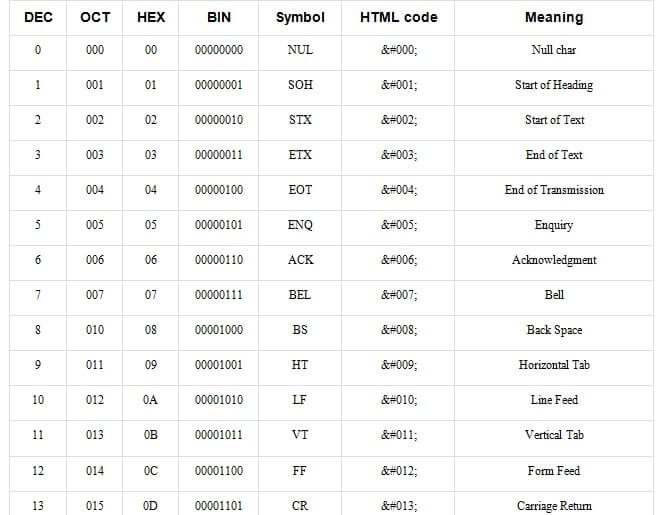Ascii Table Dev C++

C++ Ascii Chart
Typecasting is making a variable of one type, such as an int, act like another type, a char, for one single operation. To typecast something, simply put the type of variable you want the actual variable to act as inside parentheses in front of the actual variable. (char)a will make 'a' function as a char.Nov 29, 2016 Delphi is the ultimate IDE for creating cross-platform, natively compiled apps. Are you ready to design the best UIs of your life? Our award winning VCL framework for Windows and FireMonkey (FMX) visual framework for cross-platform UIs provide you with the foundation for intuitive, beautiful. Check the ASCII table; If the font used for the terminal you're running on doesn't have hearts and diamonds in it's current code page, no library will help you - you'd have to use graphics. For further reading, I'd try to find it maybe in Unicode Tables- however, unicode terminals are rare. And even if you have a Unicode font, there's no.
The Best Free Music Software Freeware, VST, VSTi, Plugins Download #looperman. VSTi Plugins, Instruments & Music Software. Here is our colection of FREE software, VST plugins, VSTi instruments, audio utilities and DAWs. A free synth plugin in VST and AU format for both Windows and MAC users. This free synth plugin delivers. We are providing you with a compilation of the best and top free vst plugins to use for your music processing and productions. These plugins are compatible with the all musical softwares including Fl studio, reaper, ableton, etc on all pc windows (32 bit & 64 bit. Vst plugins free download 64 bit java.
For example: One use for typecasting for is when you want to use the ASCII characters. For example, what if you want to create your own chart of all 128 ASCII characters. To do this, you will need to use to typecast to allow you to print out the integer as its character equivalent. The typecast described above is a C-style cast, C++ supports two other types. First is the function-style cast: This is more like a function call than a cast as the type to be cast to is like the name of the function and the value to be cast is like the argument to the function. Next is the named cast, of which there are four: static_cast is similar in function to the other casts described above, but thename makes it easier to spot and less tempting to use since it tends to beugly. Typecasting should be avoided whenever possible. The other three typesof named casts are const_cast, reinterpret_cast, and dynamic_cast. They are ofno use to us at this time.
Typecasts in practice
So when exactly would a typecast come in handy? One use of typecastsis to force the correct type of mathematical operation to take place. Itturns out that in C and C++ (and other programming languages), the result ofthe division of integers is itself treated as an integer: for instance, 3/5becomes 0! Why? Well, 3/5 is less than 1, and integer division ignores theremainder.On the other hand, it turns out that division between floating point numbers,or even between one floating point number and an integer, is sufficient tokeep the result as a floating point number. So if we were performing somekind of fancy division where we didn't want truncated values, we'd have tocast one of the variables to a floating point type. For instance,static_cast<float>(3)/5comes out to .6, as you would expect!
When might this come up? It's often reasonable to store two values inintegers. For instance, if you were tracking heart patients, you mighthave a function to compute their age in years and the number of heart timesthey'd come in for heart pain. One operation you might conceivably want toperform is to compute the number of times per year of life someone has come into see their physician about heart pain. What would this look like?The problem is that when this program is run, visits_per_year will be zerounless the patient had an awful lot of visits to the doc. The way to getaround this problem is to cast one of the values being divided so it getstreated as a floating point number, which will cause the compiler to treat theexpression as if it were to result in a floating point number:This would cause the correct values to be stored in visits_per_year. Can youthink of another solution to this problem (in this case)?
Quiz yourself
Previous: File I/O
Next: Classes